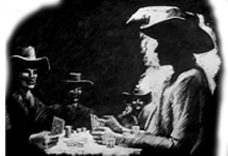





SOURCE REFERENCES
01. The Conquest of the Missouri: Captain Grant Marsh, and the Riverboats of the American Civil War and Plains Indian Wars (1909); Joseph Mills Hansom; A. C. McClurg & Co.
02. The Conjectural Maverick, Maverick Trails
03. Maverick, Stampede (1957), Warner Bros. Pictures, Inc.
Marsh, Grant
Steamboat captain of the Far West on the Missouri River and its tributaries in the late 1870s. (May 11, 1834 – January 6, 1916)[1]
Having grown up in Rochester, Pennsylvania, Marsh began his steamboating career as a cabin boy on the Allegheny River at the age of 12. At 16, he became student pilot and first mate on the Mississippi River under Samuel Clemens himself. During the early months of the Civil War, he worked riverboats on the Tennessee River, hauling troops and supplies for the Union Army. In 1862, be began working on the Missouri River, again moving troops and supplies, to support the Army against Indian hostilities in Dakota Territory.[1]
From the early days of the Montana Gold Rush, Marsh became one of the most significant pilots on the Upper Missouri. Piloting the Louelle in September of 1866, he left Fort Benton transporting a boatload of miners carrying $1,250,000 in gold, the most valuable shipment ever carried on the Missouri.[1]
From 1868 through 1873, Marsh faced many challenges — such as braving iced-over waters of the Yellowstone, fending off hostile Indians shooting at his boat, pushing through migrating herds of buffalo fording the river, winching his way up the rapids with ropes tied to a tree and grasshoppering over sand bars in low water — that earned him the status of one of the greatest rivermen of all time. In 1873, he partnered with Captain Sanford Coulson to operate the Coulson Packet Line, establishing a reputation of reliability and contracted with the Army for their expeditions and campaigns along the Missouri and Yellowstone Rivers.[1]
As captain of the Far West in May of 1876, he transported supplies up the Yellowstone for Custer's campaign against the Sioux Armstrong Custer. After the Battle of the Little Bighorn, he ran wounded soldiers from surviving detachments to Fort Lincoln, breaking all Missouri River speed records in traveling more than 750 miles in just 54 hours, bringing the first news of Custer's defeat to the world.[1]
Stampede: In April of 1877,[2] Dandy Jim Buckley bought passage aboard the Far West[3] at Vermillion, Dakota Territory, bound for St. Louis.[2] Along the way, his new holdout device developed a squeak and Captain Grant Marsh had him put off the boat, marooning him on a sand bar[3] at Winnebago Bend.[2]
Marsh continued piloting on the Missouri River, but by 1882, the Northern Pacific Railroad was built from Bismarck to the Yellowstone Valley and over the continental divide, eventually ending river traffic on the Missouri. He died in near poverty in 1916 in Bismarck.[1]

Marsh Grant
Home | The Maverick Saga | Trail Maps | Chronology | Maverick Lore | Production | The Inside Straight | Contact Maverick Trails
1
2
3
4
5
6
7
Maverick Trails is not endorsed, sponsored or affiliated with Warner Bros. Entertainment, Inc. or the Maverick franchise.
Maverick™ and its various marks are trademarks of Warner Bros. Entertainment, Inc., © 1957, 1994
©2014, 2015, 2016 Maverick Trails
